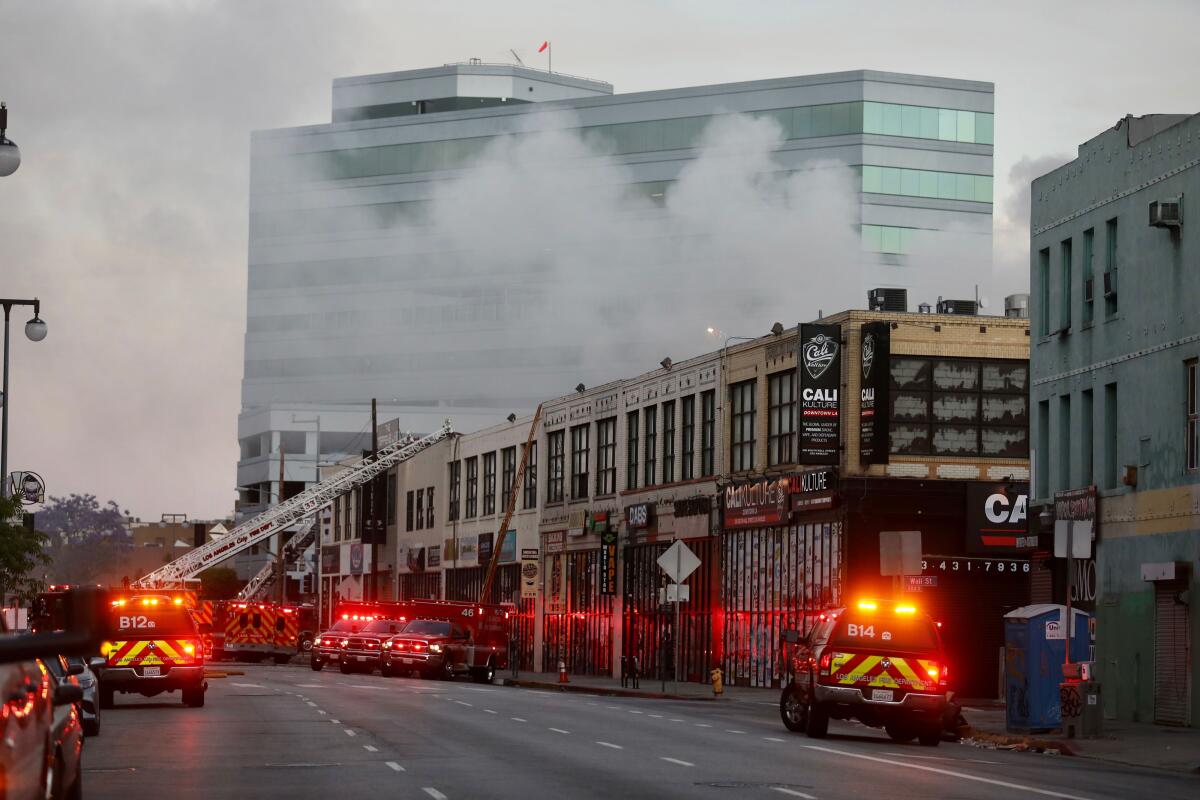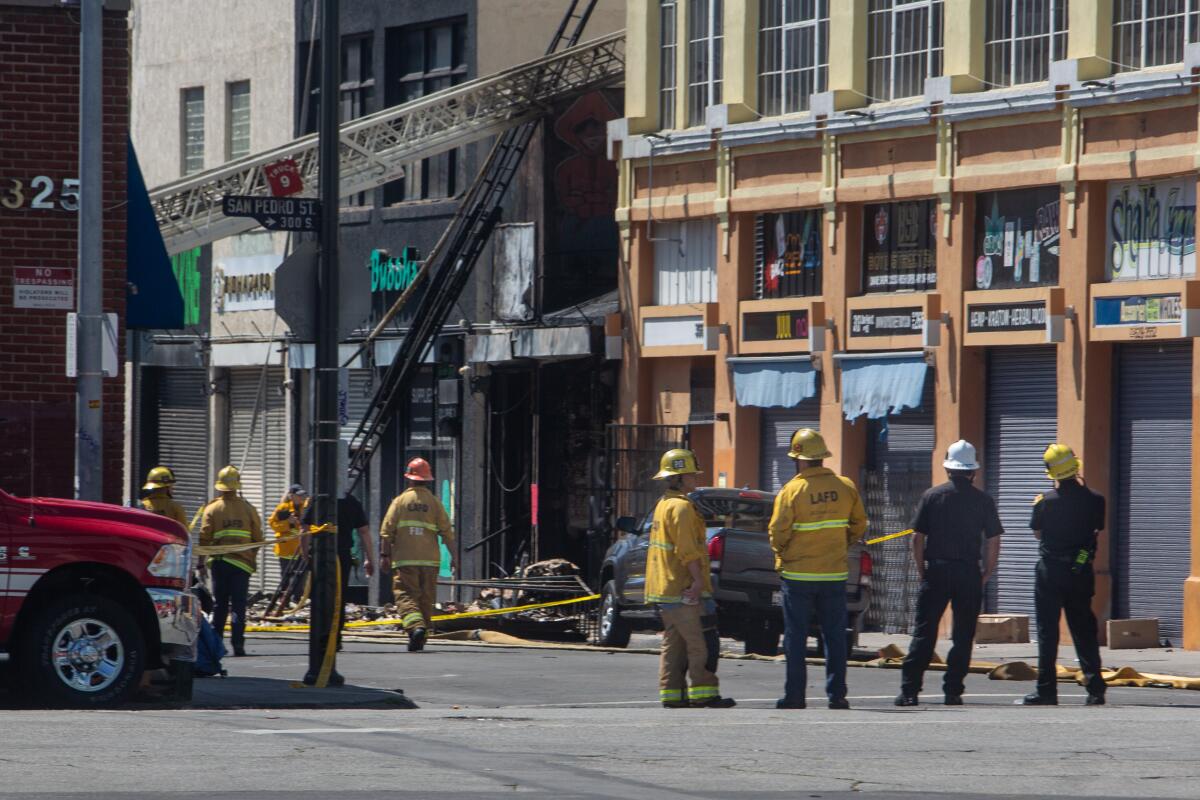Fire and police investigators work to determine cause of downtown explosion that injured 12

- Share via
A criminal investigation is underway after a massive explosion in a downtown Los Angeles warehouse on Saturday injured 12 firefighters and left several buildings damaged, law enforcement sources told The Times.
Downtown was rocked Saturday night by the blast, which broke out in an older business district off East 3rd Street, known for its various smoke shops. Authorities referred to it as Bong Row.
“We are in the early stages of an investigation. We are looking at every aspect at this stage. We haven’t determined a cause,” Los Angeles Police Department Assistant Chief Horace Frank said. “The explosion was massive and those firefighters are very lucky to be alive.”

An initial investigation identified the business that caught fire as Smoke Tokes, a warehouse distributor with supplies for butane hash oil, said Capt. Erik Scott, a spokesman for the Los Angeles Fire Department.
Authorities said carbon dioxide and butane canisters were found inside the building, and investigators are trying to determine whether oil stores on site might have sparked the blast. The cause of the fire has not been determined.
The owner of Smoke Tokes could not be reached for comment.
The explosion damaged several storefronts, melted fire helmets and left one firetruck burned and covered in debris. Officials said firefighters had to pass through a fireball to escape.
“Firefighters were coming out with obvious damage and burns,” Scott said. They ran “straight through that ball of flame to get to safety across the street.”
Eleven firefighters received treatment for burn injuries at Los Angeles County-USC Medical Center, according to the LAFD. A 12th firefighter was treated and released at an emergency room Saturday night for “a minor extremity injury,” said Nicholas Prange, an LAFD spokesman.
As of Sunday morning, three firefighters had been discharged from the hospital. Eight remained hospitalized, including two in critical but stable condition.
All were expected to survive, officials said. Doctors at USC said one firefighter would probably need skin grafts.
Firefighters first received a call about 6:30 p.m. Saturday about a structure fire in the 300 block of Boyd Street south of Little Tokyo. The businesses were not open at the time.
“This fire started off like any other bread-and-butter structure fire where we had a one-story commercial building with smoke showing,” Scott said.
LAFD Station No. 9 responded. It is one of the busiest fire stations in the nation, serving one of Los Angeles’ most troubled spots: skid row. On top of the frequent calls that existed even before the pandemic, firefighters there in recent weeks also have been conducting COVID-19 tests on skid row.
When the fire broke out Saturday night, firefighters went to the roof to try to create ventilation, and firefighters used power saws to force entry, Scott said. Others went inside, attempting to find the source of the blaze.
“It was routine until they heard a rumbling, high-pitched sound — they described it like a jet engine spinning up — along with pressurized smoke,” Scott said. Firefighters started backing out, he said, but “conditions drastically changed within moments.”
The explosion, he said, created a 30-foot-wide fireball.
“This is one of the worst incidents in recent history that we have been to,” Scott said. “Our firefighters were driven off the roof, frantically scurrying down the aerial ladder to safety through a blowtorch. Firefighters inside had to escape a massive explosion.”
All of the injured firefighters work at Station 9, according to LAFD.
Initially, officials could not account for all the firefighters.
In an LAFD radio transmission, an official is heard screaming, “Mayday! Explosion! I have two down firefighters.”
“This is a difficult time for our fire family,” Scott said, his voice tired. “Our number one concern is to take care of the injured as well as the mental health of the other firefighters on scene.”
It took more than 230 firefighters an hour and 42 minutes after the call came in to extinguish the blaze, authorities said. Video at the scene captured a series of smaller explosions after the initial blast.
On Sunday, the heavily damaged warehouse still stood, Scott said. Nearby streets were cordoned off with yellow tape.
The scene left by the fire was apocalyptic. On Sunday, the yellow jackets of firefighters who had responded to the blaze still lay on the ground, with holes burned in them. Melted helmets were scattered about.
There was a charred firetruck, Scott said, and a blackened fire hose. There were discharged fire extinguishers “possibly that were utilized to extinguish our own members,” Scott said.
LAFD Chief Ralph M. Terrazas said the firefighters responding to the call sensed something was wrong inside the building but could not escape before the explosion.
“When one of your own is injured ... you can imagine the amount of mental stress,” Terrazas said. “A lot of our firefighters were traumatized.”
Along with LAFD arson investigators, the explosion is being investigated by the criminal conspiracy section of the LAPD’s major crimes division and the gang and narcotics division, Assistant Chief Frank said.
The Bureau of Alcohol, Tobacco, Firearms and Explosives’ national response team will arrive Monday to assist in the investigation, federal officials said Sunday.
The team brings together science and fire experts who can reconstruct scenes in detail. It assisted most recently in California on the Conception boat fire, which killed 34 people in the vessel off Santa Barbara in September. The team also assisted in the investigation of the Ghost Ship warehouse fire, which killed 36 people in December 2016.
In 2016, there was another major fire at a downtown L.A. business called Smoke Tokes at an address nearby on 3rd Street. It was unclear whether that business and the one that burned Saturday were connected.
“We are aware of a fire in September 2016, nearby on 3rd Street, with a building doing business as Smoke Tokes,” Scott said Sunday. “Our arson investigators are aware of that incident, and that’s part of the active investigation.”
It took more than 160 firefighters about two hours to put out the 2016 blaze, with the flames largely confined to the wholesaler and distributor of smoking paraphernalia, The Times reported at the time.
Firefighters encountered pressurized gas cylinders that exploded amid the inferno, but there were no injuries in the 2016 fire.
“It was a tricky fire for us,” LAFD Battalion Chief Mark Curry said at the time. “We had multiple explosions going off inside the fire while it was burning due to the butane containers releasing.”
More to Read
Sign up for Essential California
The most important California stories and recommendations in your inbox every morning.
You may occasionally receive promotional content from the Los Angeles Times.













